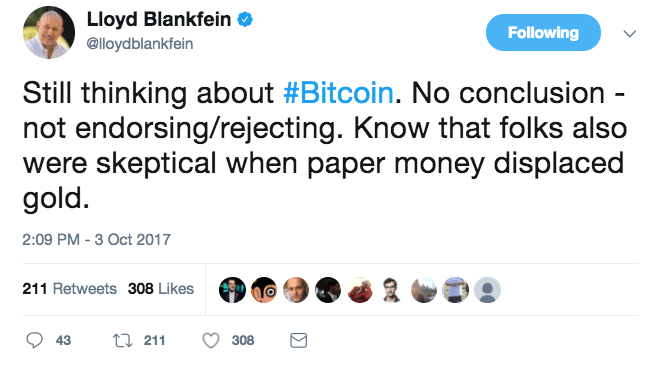Goldman, like everyone else in the world, is still trying to figure out what Bitcoins is and what it does.
Back in October, the crypto crowd was excited to learn that just weeks after Jamie Dimon famously called Bitcoin a “fraud”, Lloyd Blankfein was weighing the merits of starting a Bitcoin trading operation. He would walk back the speculation a few days later on Twitter as follows:
Fast forward a month (give or take) and, in an interview with Bloomberg, Lloyd came across as pretty open-minded about the crypto space. A couple of weeks after that, following a truly absurd bout of volatility that saw Bitcoin plunge more than 20% after hitting an intraday high near $11,400 (that was back when $11,000 was still a big deal), Blankfein seemed to sour on the digital currency anew. “Something that moves up and down 20 percent in a day doesn’t feel like a currency, doesn’t feel like a store of value,” Blankfein told Bloomberg in another interview. “If it works out — and it gets more established, and it trades more like a store of value, and it doesn’t move up and down 20 percent, and there is liquidity to it — we’ll get to it.”
Meanwhile, Goldman’s Jeff Currie advised everyone to just calm down. “I don’t see why there is all this hostility to it,” Currie said late last month. “Bitcoin is not much different than gold because it doesn’t have liability attached to it by definition, like a security,” he added.
Ok, so that brings us to today when, in a new note, that same Jeff Currie sets out to debunk the notion that Bitcoin is taking demand from gold. This argument has been bandied about a lot lately and for his part, Currie thinks it’s probably spurious for the following three reasons:
Lastly, Currie goes on to at least tacitly suggest that Tyler Winklevoss may be getting way ahead of himself with the whole “gold disruptor” narrative. To wit, from Currie:












Leave A Comment